This discourse is indeed about the environment but you must be a tad patient.
I’ve long been interested in matters of the soul as first introduced to me by my Mom. If I couldn’t see that a cloud formation looked just like a man on a horse she’d mildly chide me, “Have you no soul Rafe?” Her Dad, my Gandhi, used to take me into the woods that abutted his farm in Burnaby – yes, in Burnaby – and show me the moss on the north side if trees, the salamanders in the pond, and he’d make a slingshot for me out of a Maple sapling. He talked a lot about the soul – it was that, not substance that really mattered.
Now let me tell you a story written by G.E.M. Skues .
Mr. Castwell, a wealthy, devoted fly fisherman, having made his last cast, passed away and found himself on the most beautiful trout stream he had ever seen. There was a man there who introduced himself as his keeper and handed Castwell a beautiful Hardy rod and reel and pointed to the river where there lay four beautiful trout, each five pounds, easily.
Have a cast, said the keeper and Castwell was into a fish first cast. The next cast was an identical result as it was thereafter – a cast made, a hook-up, a fish landed, and a new fish took its place.
And so it went and each time Castwell would suggest to his keeper that a rest would be in order he was told that the “Master” wouldn’t like that.
When the time came that Mr. Castwell thought was surely the end of the day, he asked the keeper when one quit for a nice drink, dinner, and bed. The keeper replied “sir, you don’t stop – the Master wouldn’t like that.”
“Hell!” yelled Castwell.
“Yes,” replied the keeper.
Castwell, the man without a soul, saw that what he valued most was now a merciless sentence when seen only for itself.
In this context I considered the afterlife of The Fraser Institute folks and those true to their notion that if only the stupid lower classes would let the rich get even richer, why a cascade of riches would trickle down amongst them – punctuated by mind-numbing nonsense about how all boats rise on the same tide, and so on.
I thought of the corporation folks who recognize that some people see a value in the environment so hire hugely expensive PR flacks to make people believe the pipelines, tanker traffic, alienated farm land, massacred fish, and shattered rivers were actually good for us all. Very good things to have as we “move forward,” says the song of the polluter. All the time, of course, the flacks tell about their client’s deeply-held commitment to “green-ness”.
And what of others who, in Wilde’s words, know the “cost of everything and the value of nothing” – like Gordon “Pinocchio” Campbell and his mindless band of toadies – what should happen to them when they hop the twig?! If they were like Mr Castwell, what would be their eternal reward?
I discovered the answer when Wendy and I went to the Land of Oz, to Emerald City, aka Dubai – Las Vegas writ large. Wendy and I spent 10 hours touring Dubai and saw that it hasn’t got a single vestige of the outdoors in it. Everything is man-made. There is nothing to turn your attention from the bricks and mortar. Dubai is utterly soulless. There was the phallic symbol that was their answer to Toronto’s CN Tower. Sadly, the grand prize for national idiocy and hubris has gone to a new idiotic spire of steel and glass in Shanghai.
There’s a building shaped like a watermelon on end, one like a giant wave of surf and so on.
There are no rivers or babbling brooks to interfere with the noise of bustle. No clumps of trees with the irritating chirping of birds. The only animals are in the zoo which the voice in my ear proudly says holds 50 imported animals from all over the world. One Aquarium boasted 89 kidnapped dolphins…or was it 189? Whatever it was, we felt instantly ill.
Dubai is the second largest of the United Arab Emirates, that being seven federated sheikhdoms. It is governed by a “ruler” who is also prime minister of the UAE. Citizens are not bothered by decadent customs like voting or democracy – Kevin Falcon, who once expressed a desire for development rules being like China, would love Dubai, where only a little token of one’s esteem of the ruler is required. No one protests. Anyone used to reading the Vancouver Sun and the Province would feel right at home reading the government “rag”.
Dubai, the voice in my ear tells me, is almost all Islamic, but that great tolerance is shown Catholic and Protestants. Nothing was said about Jews – perhaps just an oversight.
There are no liquor stores – this would no doubt merit Mr. Campbell’s approval – but how do naughty citizens get booze (the “rulers” are not subject to prohibition)?
Our server in the bar smiled…”There are ways”.
You can, of course, get lots to drink in the innumerable bars in the never-ending supply of hotels.
We were taken to the courthouse and told that Egyptian law prevailed and that there was almost no crime. I assumed that the paved area in the back was for stoning fallen virtue.
There is outdoor skiing all year round on genuine snow! Where a city in which 22C is considered a cold snap gets this magic “genuine” snowfall remains a mystery.
There is, of course, an ice rink the size of ten football fields – or was it 20? Or 200? After a bit of listening to mind-numbing superlatives for 10 hours, it all become hard to absorb.
There is every physical joy one can conceive of in Dubai – it’s an engineer’s or money man’s dream come true.
Alas, there’s naught for the soul.
Dubai is the Fraser institute, Gordon Campbell’s and the developer’s ultimate icon – the embodiment of all they stand for. In their life to come, Dubai surely represents their idea of God’s work and proves once more that engineers with money can improve nature’s legacy…
I promised that this column would be about the environment and here goes.
The UAE is one of the world’s largest consumers of water and here – wait for it – is how they get it. Nearly 80% from desalination!
Having almost no fresh water, Dubai takes the salt out of the abundant ocean. It costs a hell of a lot more than our system does but, not having fresh water, they must “mine” it.
This makes you think a bit. If California needs water, why not take if from their endless supply of ocean? Why not “mine” salt water, and distribute it by pipeline across their country?
It’s not that the US hasn’t got water – 80% of the earth is water. What the US lacks is the desire to pay for it (not having Dubai’s access to cheap, abundant oil)!!
Question: WHY THE HELL SHOULD BC SELL THEM OUR WATER JUST BECAUSE WE CAN GET IT CHEAPER?
This question applies with the same, indeed greater, force to power. Why should British Columbia ruin more and more of its rivers and streams so that the US can buy it for less than it would cost them? And with the profits not going to BC but large international corporations! Why do we virtually give these companies licenses so that they can use our rivers to finance their massive theft of our resources? Why should we desecrate our rivers, and the ecologies they support, so that Americans needn’t do so to theirs?
No doubt the US would have to find power and it might well come from fossil fuels or nuclear. But there are ways to do this well within clean air requirements. The only reason they’re not doing this is because we relieve them of the burden.
While I wish the Milton Friedman acolytes, the Fraser Institute, and Campbell et al. an eternity in Dubai – riding rider-less monorails, going up and down in outdoor glass elevators, or sitting forever on the top of a “Big Bus” sightseeing bus, in the manner of Mr. Castwell – in the meantime we in BC must stop this environmental bleeding before it’s too late.
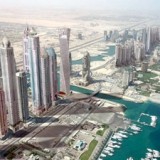

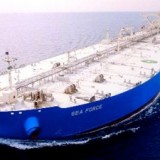

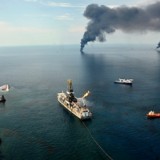
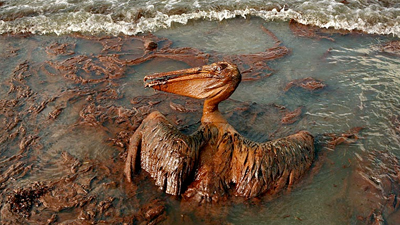 It is thus a testament to our 24-hour news cycle, tabloid-saturated, overworked, short attention spanned society that we have largely already forgotten the sense of sheer powerlessness and intense fear that gripped the world in the months of the Gulf crisis. It is with good cause that Gore Vidal uses the term “the United States of Amnesia.”
It is thus a testament to our 24-hour news cycle, tabloid-saturated, overworked, short attention spanned society that we have largely already forgotten the sense of sheer powerlessness and intense fear that gripped the world in the months of the Gulf crisis. It is with good cause that Gore Vidal uses the term “the United States of Amnesia.”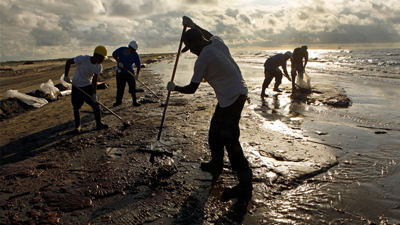 All the while, a slew of breathtaking images poured forth –
All the while, a slew of breathtaking images poured forth –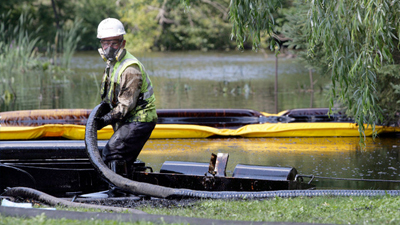 The Gulf itself played host to a
The Gulf itself played host to a 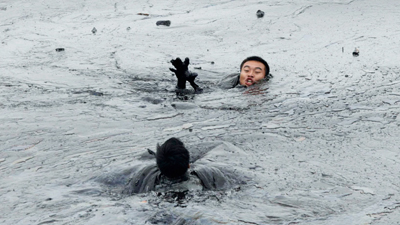 And those are just the big ones. A cursory study of the business of oil, gas, and coal exploitation and use reveals a litany of small-scale – bu nevertheless environmentally significant – pipeline leaks, tailing pond malfunctions, and myriad problems with the extraction, refining transportation, and burning of fossil fuels. They’re all just standar externalities – part of the cost of doing business, born by the planet, whil corporations reap record profits.
And those are just the big ones. A cursory study of the business of oil, gas, and coal exploitation and use reveals a litany of small-scale – bu nevertheless environmentally significant – pipeline leaks, tailing pond malfunctions, and myriad problems with the extraction, refining transportation, and burning of fossil fuels. They’re all just standar externalities – part of the cost of doing business, born by the planet, whil corporations reap record profits.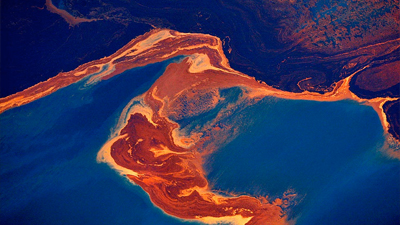 One of the highlights of my 2010 was spending several weeks amid BC’ Great Bear Rainforest, traveling the very coastline Enbridge wishes to se plied by the world’s largest oil tankers. Having witnessed and
One of the highlights of my 2010 was spending several weeks amid BC’ Great Bear Rainforest, traveling the very coastline Enbridge wishes to se plied by the world’s largest oil tankers. Having witnessed and